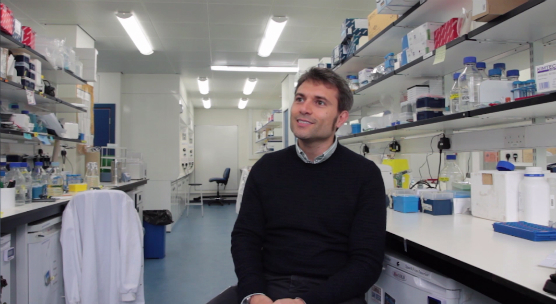Boehringer Ingelheim and University of Dundee collaborate to develop new class of medicines
Published On Thu 14 Jul 2016 by Grant Hill

- Collaboration aims to develop PROteolysis TArgeting Chimeric molecules (PROTACs) – a new therapeutic modality that is able to degrade proteins playing a central role in disease processes
- PROTACs and their new mechanism of action are expected to open new horizons for drug development allowing new drug targets to be accessible
- Research has potential to develop innovative new treatment options for patients with high medical need
Boehringer Ingelheim and the University of Dundee will join forces in an exciting collaboration aiming to develop a novel class of medicines that target disease-causing proteins for degradation.
The collaboration brings together the expertise of the University’s Dr Alessio Ciulli, one of the pioneers in the field of PROteolysis TArgeting Chimeric molecules (PROTACs), with Boehringer Ingelheim’s expertise in drug discovery and clinical development of new therapeutic agents.
PROTACs are designed to harness the cell’s natural disposal system (the ubiquitin-proteasome) to specifically remove disease-causing proteins. They do this by triggering the labelling of these as “expired” proteins, which the proteasome then removes.
PROTACs are anticipated to be broadly applicable to therapeutic areas as diverse as oncology, immunology and respiratory diseases. It opens up opportunities to target disease mechanisms that have been difficult to reach with existing modalities.
To trigger the degradation of target proteins, PROTACs are made of one moiety that binds the target and another that binds an ubiquitin ligase enzyme, and as a result they are likely to exceed the size of conventional oral drug molecules. The design of such “medium-sized” drug molecules represents a considerable challenge.
“We believe our approach has the potential to fundamentally transform how we tackle protein targets to fight disease”, said Dr Ciulli, winner of the 2015 EFMC Prize for a young medicinal chemist in academia.
“We are very excited to partner with Boehringer Ingelheim, one of the world's 20 leading pharmaceutical companies. This is a prime example of an industry-academia collaboration to establish a disruptive new approach to drug discovery, initially developed in academia, and to enable its translation all the way to benefit patients.”
The collaboration will not only build on recent ground-breaking work of Dr Ciulli and his team, but will also benefit from top facilities and expertise available within the School of Life Sciences at Dundee, including the MRC Protein Phosphorylation and Ubiquitylation Unit, headed by Professor Dario Alessi, and the FingerPrint Proteomics Facility, co-directed by Professors Mike Ferguson and Angus Lamond and managed by Dr Douglas Lamont.
“We are looking forward to working with Dr Alessio Ciulli, one of the world leaders in this exciting new research area,” said Clive R. Wood, Ph.D., Senior Corporate Vice President, Discovery Research at Boehringer Ingelheim.
“Working closely with the researchers at the University of Dundee, one of the top research centres in the UK for life sciences, we aim to establish a unique platform that can generate PROTAC-based drug candidates for multiple areas of unmet medical need."
Boehringer Ingelheim is focusing on developing innovative new treatment approaches providing outstanding value for patients. To achieve this, the company is increasing its commitment to external innovation, and is working with top partners from academia and industry worldwide. A growing network of academic collaborations reflects the company’s focus on emerging science that could open new avenues leading to the breakthrough medications of the future.
Professor Julian Blow, Dean of the School of Life Sciences at Dundee, said, “The University of Dundee is in the enviable position of being number one in the UK for biological sciences as well as being recognised as one of the most innovative universities in Europe.
“This collaboration embodies both these aspects of our work - extremely high quality research from one of our talented young researchers that is translatable to patient benefit. The university has a mission to transform lives and this is the kind of research partnership which can do that.”
For media enquiries contact:
Grant Hill
Press Officer
University of Dundee
Nethergate, Dundee, DD1 4HN
Tel: +44 (0)1382 384768
Mobile: 07854 953277
Email: g.hill@dundee.ac.uk